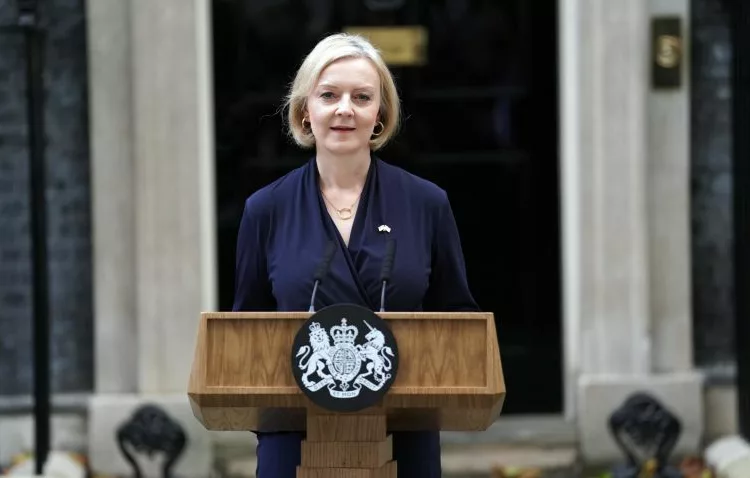British Prime Minister Liz Truss yesterday made history as the shortest occupant of the office as she resigned after just 45 days in 10, Downing Street, the United Kingdom (UK) seat of power.
Truss beat the record of Prime Minister George Canning, who served for 119 days when he died in 1827.
Her exit attracted swift reactions from Nigerian experts in international relations who warned that the country risks suffering significant impacts of the economic crisis in Britain, which forced Truss to announce her resignation.
The experts who spoke to LEADERSHIP Friday were of the view that Nigeria and some other Anglophone countries that have traditional ties with Britain would have to rethink their engagements with the United Kingdom (UK) or remain in the precarious situation of servitude.
Liz Truss yesterday announced she would stand down as leader of the Conservative Party, just six weeks after she was appointed, after her policies triggered economic turmoil and sharply divided the party.
Tory members of parliament (MPs) urged Ms Truss to go after her government was engulfed by political turmoil, following the ditching of most of her economic policies.
Truss was elected by the Tory membership in September but she lost authority after a series of U-turns.
Speaking outside her Downing Street office yesterday, Truss accepted that she could not deliver the promises she made when she was running for Conservative leader, having lost the faith of her party.
“I recognise though, given the situation, I cannot deliver the mandate on which I was elected by the Conservative Party. I have therefore spoken to His Majesty the King to notify him that I am resigning as leader of the Conservative Party,” she said.
The Conservative Party will hold a leadership election within the next week to replace Truss, who is the shortest-serving prime minister in British history.
Speaking to LEADERSHIP Friday yesterday, the director of the Centre For China Studies, an Abuja-based think tank, Charles Onunaiju, said Britain is a traditional partner of Nigeria and its crisis has serious implications for Nigeria because of the elaborate engagements between both countries.
“What happens to these big economies will affect the third world economies, especially those that are linked to them. So, in most cases countries in the periphery of these metropolitan countries bear the brunt of this. I think what is happening in Britain obviously will have an impact on Nigeria. It will affect remittances from the UK which accounts for a reasonable portion of our Diaspora remittances. So, as the UK economy shrinks and hits a crunch, there will be trickles of remittances against what it used to be.
“Our trade with Britain is not very significant but it could dim further based on this and the UK Aid support that comes from the DFID and other UK agencies could witness gradual dry up as they pour in a lot of their own liquidity to solve their problem. Sometimes they have to ride roughshod over us to overcome their crisis. So, at the end of the day we might be bearing the brunt.
“The challenge is how do we internally integrate our economy and build a resilient economy that will not necessarily be buffeted by external shocks? But the way we are today we are vulnerable to shocks especially from the metropolitan countries,” he said.
Also speaking, international constitutional law expert, Livingstone Wechie, said, “The Nigerian economy and largely the economies of most African states particularly the Anglophone Africa are tied to apron strings of the British dictates. So, the implication is that the economies in Africa tied to the British until they begin to pull back and rethink their strategies, they too will have a spillover of impact because as it affects Britain so will it affect all those that are tied to Britain except for those who will revolt with policies.
“There should be a policy revolt by African countries to rethink their economic framework, their bilateral relationship and be more independent even if in the global trade all countries trade with one another. But if a country is trading under servitude, it will become a victim of the failures that the bigger economies will record.”
He noted that the UK was going through an economic collapse that has made it almost impossible for any leadership to fix. He said the bottom line is that the global economic conditions are not peculiar to any state but the British leadership is gradually showing incapacity to manage its affairs.
On the resignation of two UK prime ministers in quick succession, Wechie said it showed that Britain is a society of results and any one that fails to produce the needed results for the British society will become unpopular and will have no other option than to resign.





